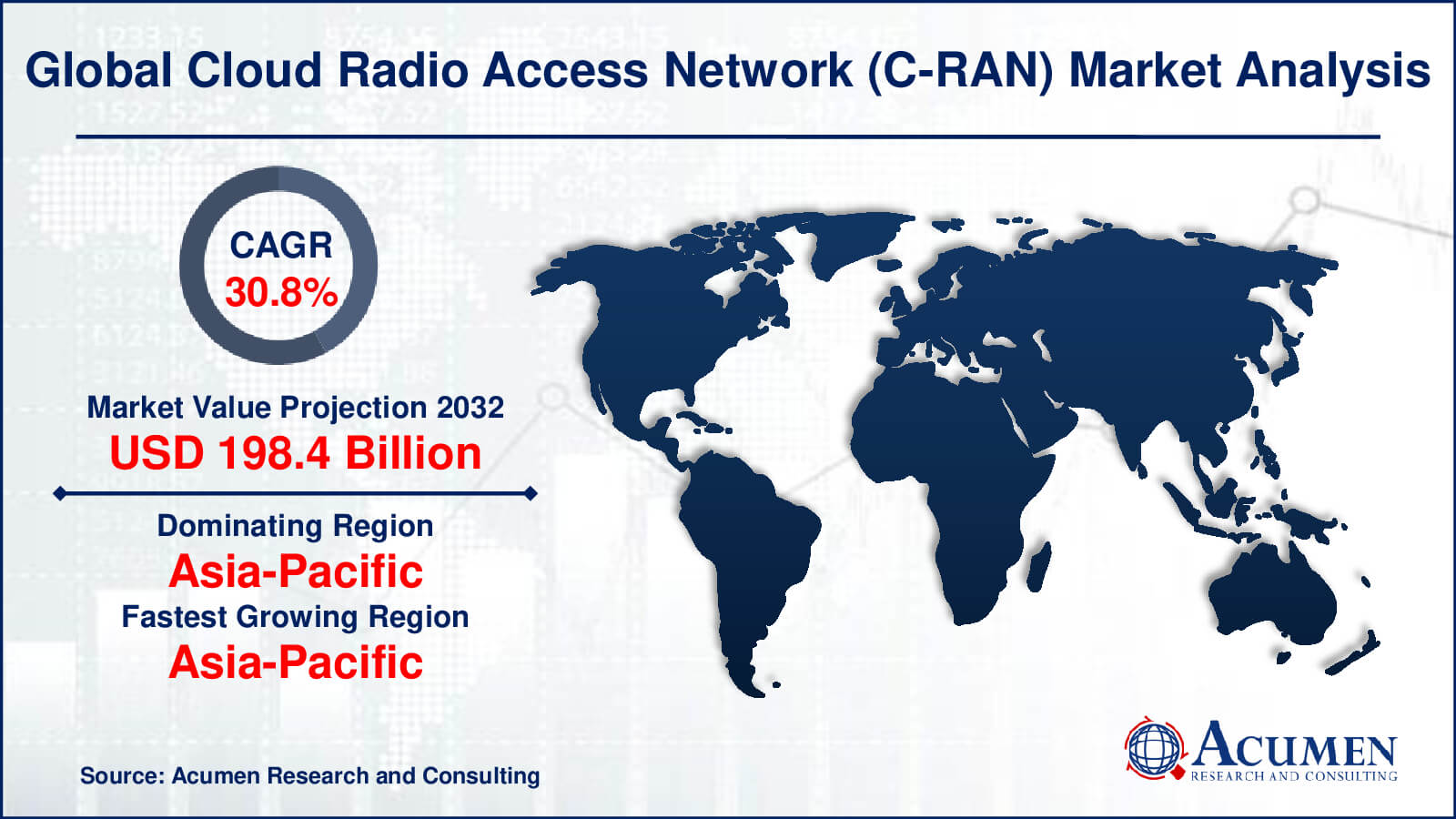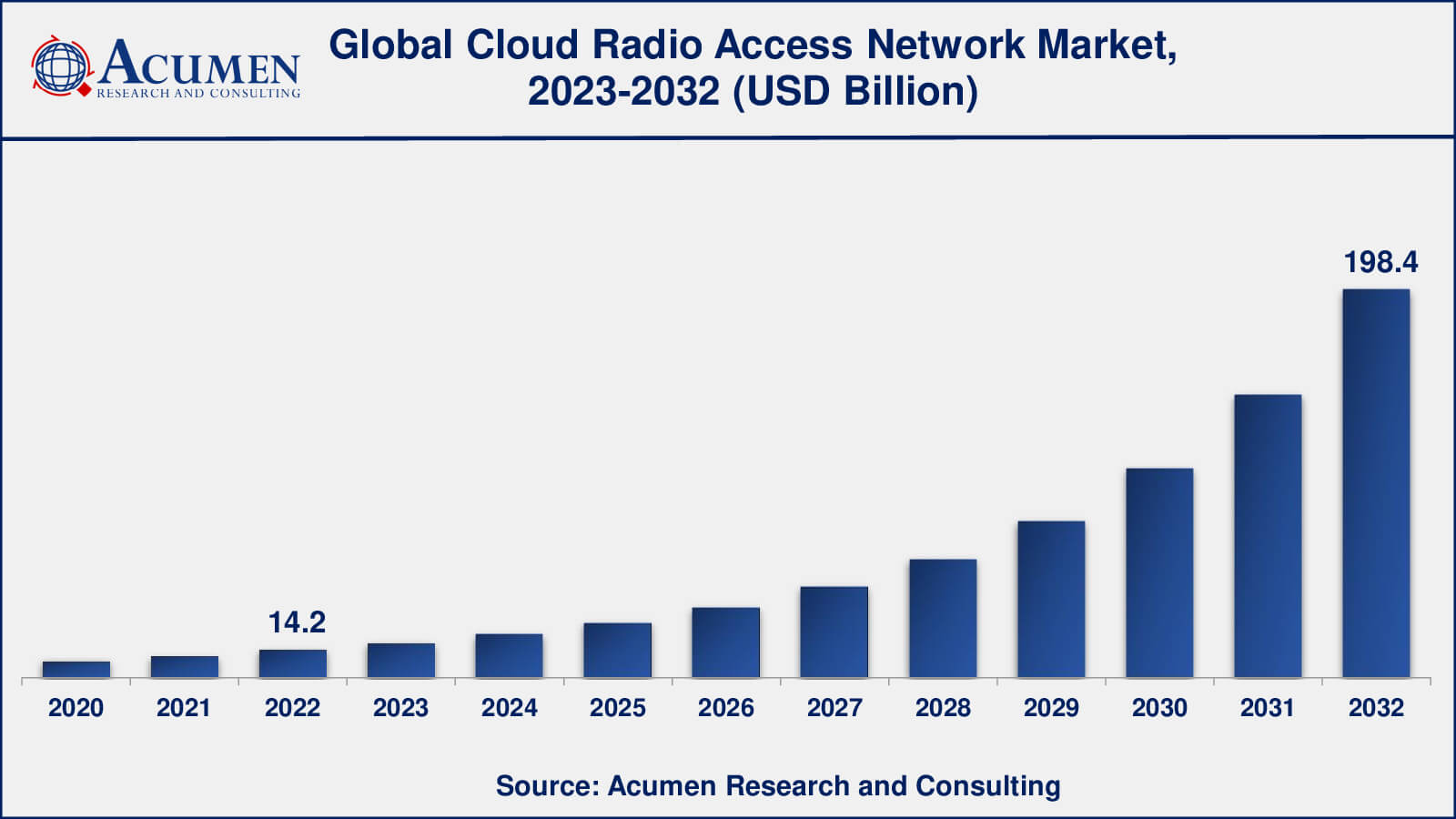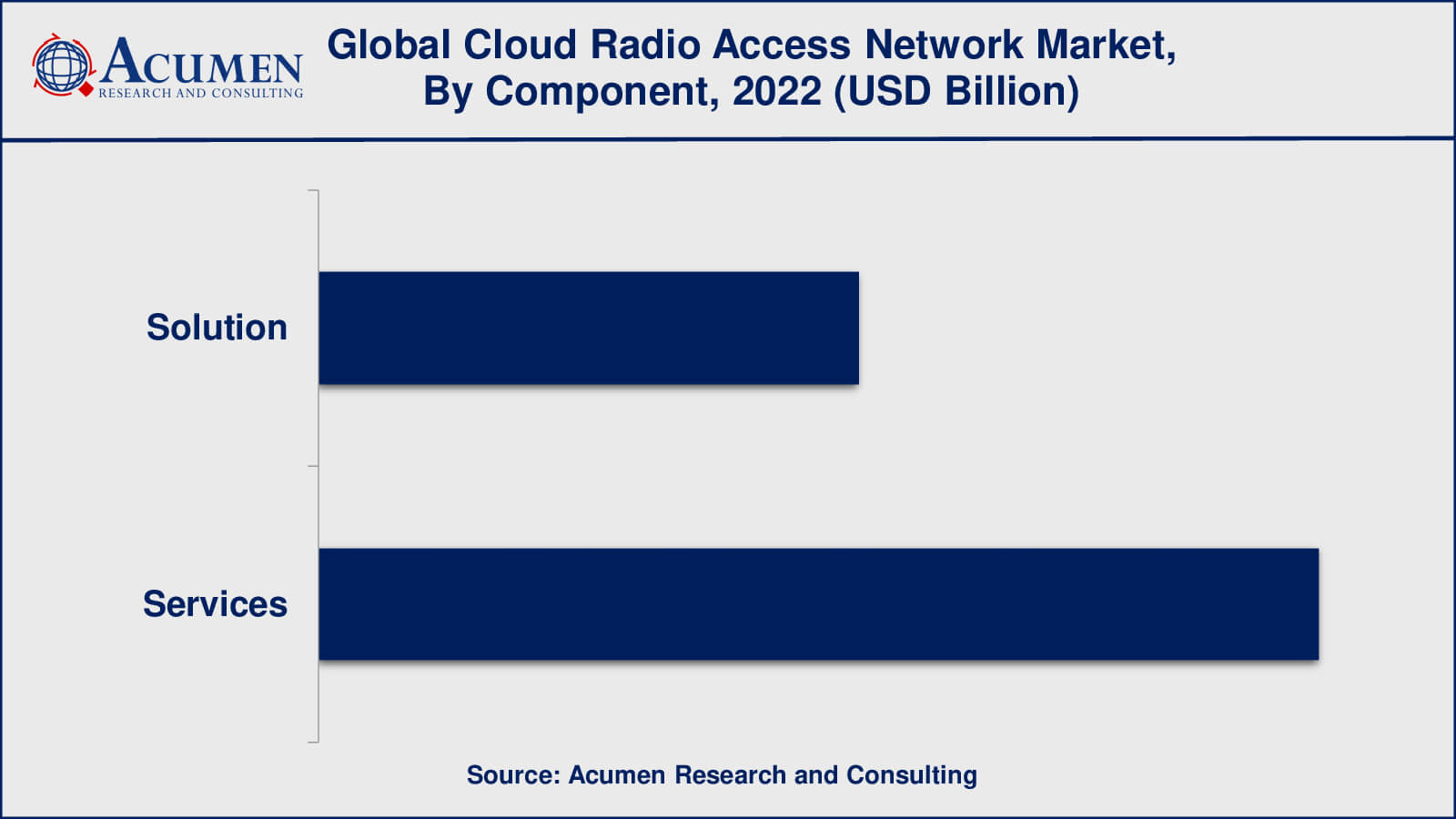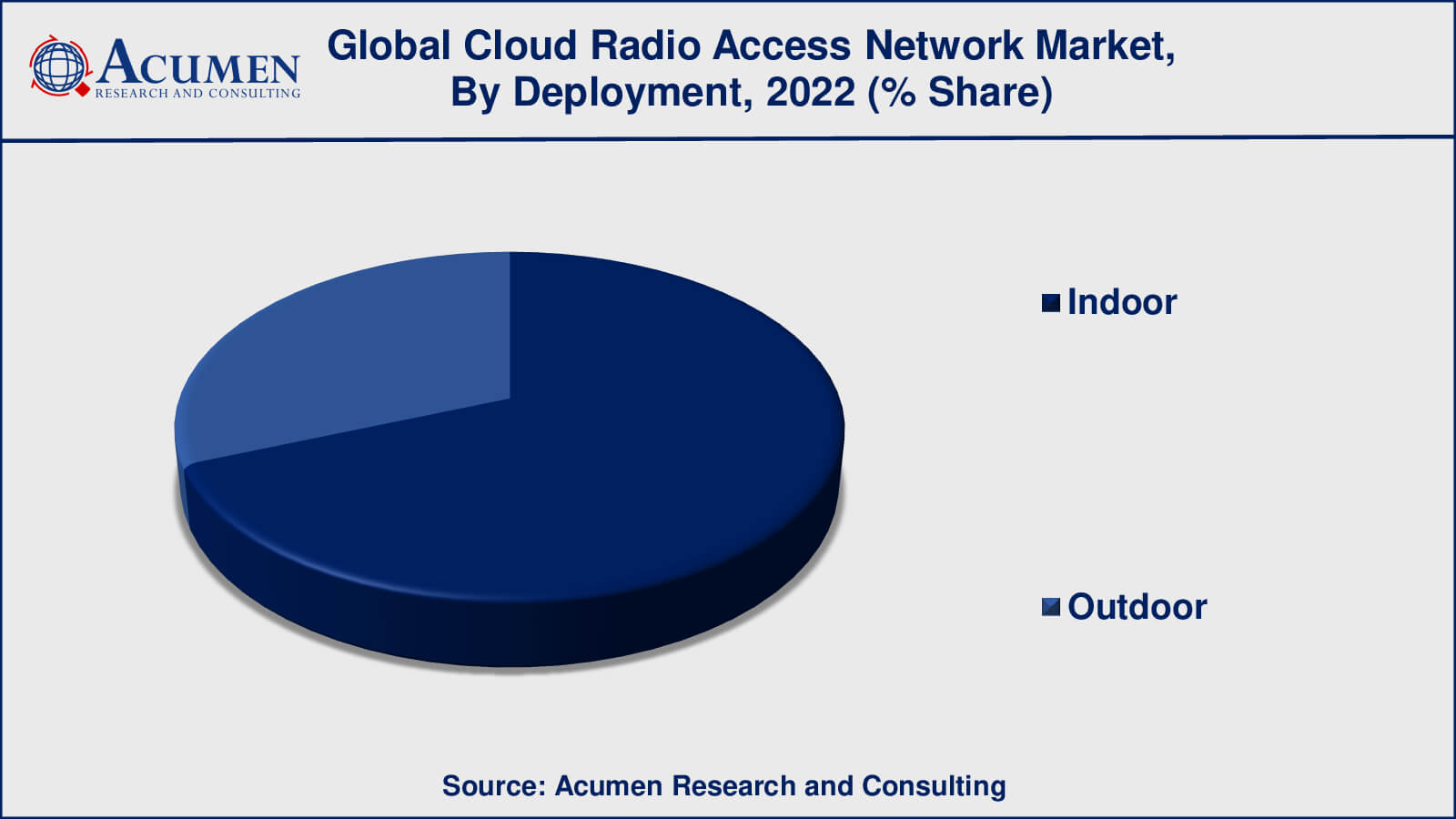Cloud Radio Access Network Market Size - Global Industry, Share, Analysis, Trends and Forecast 2023 - 2032
Published :
Report ID:
Pages :
Format :
Cloud Radio Access Network Market Size - Global Industry, Share, Analysis, Trends and Forecast 2023 - 2032
Report Coverage
- Industry Dynamics
- Market Size and Forecast Data
- Segment Analysis
- Competitive Landscape
- Regional Analysis with a Niche Focus on Country-Level Data
- High Level Analysis - Porter's, PESTEL, Value Chain, etc.
- Company Profiles of Key Players
- Option to Customize the Report As Per Your Specific Need
Request Sample Report
The global Cloud Radio Access Network (C-RAN) Market size was valued at USD 14.2 Billion in 2022 and is projected to attain USD 198.4 Billion by 2032 mounting at a CAGR of 30.8% from 2023 to 2032.
Cloud Radio Access Network (C-RAN) Market Highlights
- Global cloud radio access network (C-RAN) market revenue is poised to garner USD 198.4 billion by 2032 with a CAGR of 30.8% from 2023 to 2032
- Asia-Pacific cloud radio access network (C-RAN) market value occupied around USD 4.7 billion in 2022
- Asia-Pacific cloud radio access network (C-RAN) market growth will record a CAGR of more than 32% from 2023 to 2032
- Among component, the solution sub-segment occupied over US$ 9.2 billion revenue in 2022
- Based on deployment, the indoor sub-segment gathered around 69% share in 2022
- Centralized intelligence leading to better resource management and coverage is a popular cloud radio access network (C-RAN) market trend that drives the industry demand

Cloud radio access network (Cloud RAN or C-RAN) is a centralized and virtualized cellular network design. It seeks to increase the efficiency and performance of mobile communication networks by transferring some base station functions from traditional dispersed base stations to a centralized and virtualized infrastructure known as the "cloud." This cloud architecture is made up of powerful data centers that are equipped with high-performance computing resources and network connections.
Centralized baseband processing, virtualization, baseband pooling, and centralized intelligence are key components of Cloud RAN market. Moving the baseband processing activities of many base stations to a data centre or cloud environment is what centralized baseband processing entails. Virtualization technologies separate hardware and software components, allowing for more flexibility and agility in network management. Baseband pooling enables several base stations to share a shared pool of baseband processing resources, allowing for more efficient resource allocation and load balancing. Advanced signal processing methods and radio resource management may be deployed more efficiently with centralized intelligence, enhancing network performance and resource utilization.

Global Cloud Radio Access Network (C-RAN) Market Dynamics
Market Drivers
- Growing demand for high-speed data services and enhanced mobile broadband
- Cost savings and improved network efficiency for operators
- Increased adoption of virtualization and cloud technologies in the telecom industry
- Advancements in 5G technology and its deployment
Market Restraints
- High initial setup costs and infrastructure investments
- Complex network integration and migration challenges
- Dependence on reliable and low-latency fronthaul networks
- Security and privacy concerns in centralized networks
- Limited availability of skilled professionals for managing virtualized networks
Market Opportunities
- Growing demand for IoT and connected devices, requiring efficient network support
- Potential for network densification and improved capacity management
- Deployment in rural areas and emerging markets to expand network coverage
- Leveraging AI and machine learning for advanced network optimization
- Collaborations between telecom operators and cloud service providers
Cloud Radio Access Network (C-RAN) Market Report Coverage
| Market | Cloud Radio Access Network (C-RAN) Market |
| Cloud Radio Access Network (C-RAN) Market Size 2022 | USD 14.2 Billion |
| Cloud Radio Access Network (C-RAN) Market Forecast 2032 | USD 198.4 Billion |
| Cloud Radio Access Network (C-RAN) Market CAGR During 2023 - 2032 | 30.8% |
| Cloud Radio Access Network (C-RAN) Market Analysis Period | 2020 - 2032 |
| Cloud Radio Access Network (C-RAN) Market Base Year | 2022 |
| Cloud Radio Access Network (C-RAN) Market Forecast Data | 2023 - 2032 |
| Segments Covered | By Component, By Type, By Network Type, By Deployment, By End-user, And By Geography |
| Regional Scope | North America, Europe, Asia Pacific, Latin America, and Middle East & Africa |
| Key Companies Profiled | Altiostar, Cisco Systems, Inc., Ericsson, Fujitsu, Huawei Technologies Co., Ltd., Intel Corporation, NEC CORPORATION, Nokia Corporation, Qualcomm Technologies, Inc., Samsung Electronics Co. Ltd., and ZTE Corporation. |
| Report Coverage |
Market Trends, Drivers, Restraints, Competitive Analysis, Player Profiling, Covid-19 Analysis, Regulation Analysis |
Cloud Radio Access Network (C-RAN) Market Insights
The cloud radio access network (C-RAN) market is driven by several factors that are shaping the future of mobile communication networks. One of the primary drivers is the growing demand for high-speed data services and enhanced mobile broadband. As the use of data-intensive end-users and services, such as video streaming, online gaming, and cloud-based end-users, continues to rise, there is a pressing need for networks that can support these demands with improved efficiency and higher data rates. C-RAN's centralized intelligence and resource pooling capabilities enable operators to meet these demands effectively.
Another important driver of C-RAN market adoption is cost savings and enhanced network efficiency. Operators may optimize resource utilization, minimize energy consumption, and improve network administration by centralizing baseband processing operations and vitalizing network components. This results in cost savings and operational improvements, making C-RAN an appealing solution for telecom operators wishing to improve network capabilities while lowering costs.
The continuous advancements in 5G technology also play a pivotal role in driving the Cloud RAN market. 5G networks demand increased capacity, low latency, and improved network performance, which align well with the capabilities offered by C-RAN architecture. C-RAN facilitates the deployment of 5G networks with its centralized processing and advanced radio resource management, enabling operators to unlock the full potential of 5G technology and deliver a superior user experience.
Despite these drivers, the cloud radio access network market faces certain restraints that need to be addressed. One significant restraint is the high initial setup costs and infrastructure investments required for deploying C-RAN networks. Building a robust fronthaul network with low-latency connections between remote radio units and centralized baseband units can be costly, particularly for large-scale deployments.
Moreover, the transition from standard RAN to C-RAN presents complicated network integration and coordination problems, which can create delays and stymie wider adoption. C-RAN success is dependent on the seamless integration of traditional network parts with virtualized components, which needs meticulous design and implementation. Concerns about security and privacy also limit C-RAN implementations. With sensitive data and important network operations centralized in data centers, establishing effective security measures to protect against possible cyber attacks and unauthorized access becomes critical.
Despite these obstacles, the C-RAN business offers several prospects for growth and expansion. The growing use of IoT devices, as well as the expansion of linked devices across sectors, creates a need for efficient and scalable networks. C-RAN's ability to handle a wide range of traffic needs while also efficiently managing network resources makes it a perfect choice for supporting the expanding IoT ecosystem. Finally, the necessity for enhanced network efficiency, faster data rates, and the introduction of 5G technologies are driving the Cloud RAN market. Despite cost, network integration, and security problems, C-RAN provides considerable development prospects by catering to IoT, network densification, and strategic alliances within the telecom and cloud sectors.
Cloud Radio Access Network (C-RAN) Market Segmentation
The worldwide market for cloud radio access network (C-RAN) is split based on component, type, network type, deployment, end-user, and geography.
Cloud Radio Access Network C-RAN Components
- Solution
- Services

According to a cloud radio access network (C-RAN) industry research, the services component dominated the cloud radio access network (C-RAN) market. The services component covers professional and support services provided by vendors and third-party providers to network operators to help them in the development, deployment, and maintenance of C-RAN networks. Network design, integration, optimisation, advising, and continuous technical support are examples of these services.
Several reasons contribute to the services component's dominance in the C-RAN industry. To begin, C-RAN deployments might be difficult, necessitating specialised knowledge to assure effective implementation and interaction with existing network equipment. Network operators frequently rely on professional services from vendors and industry professionals to build and plan C-RAN deployments that are suited to their individual network needs.
Cloud Radio Access Network C-RAN Types
- Centralized-RAN
- Virtualized/Cloud RAN
Both centralized-RAN and virtualized/cloud RAN were significant types within the cloud radio access network (C-RAN) market, with each addressing specific architectural and operational considerations. However, virtualized/cloud RAN (sometimes referred to as vRAN or Cloud RAN) was gaining prominence as a dominant trend.
Virtualized/cloud RAN involves the virtualization of baseband processing functions and the centralization of these functions in cloud data centers. This approach offers greater flexibility, scalability, and resource optimization compared to traditional Centralized-RAN architecture. Virtualized/Cloud RAN allows for the distribution of baseband functions across a centralized cloud infrastructure, making it possible to efficiently allocate processing power and resources as needed.
Cloud Radio Access Network C-RAN Network Types
- 2G/3G
- 4G (LTE)
- 5G
According to cloud radio access networks (C-RAN) industry analysis, the 4G (LTE) network type will dominate the business in 2022. The widespread deployment and use of 4G networks contributed significantly to the growth and revenue of the C-RAN industry. C-RAN technology gained appeal as 4G LTE networks evolved owing to its ability to meet these networks' rising capacity and performance needs. C-RAN's centralised and virtualized design increased resource management, network efficiency, and performance for 4G operators, making it a favoured option for many deployments.
While C-RAN was used in select 2G and 3G networks, it reached its full potential with the advent of 4G LTE technology. As operators prepared to shift from 2G/3G to 4G and faced increased data needs, C-RAN's capabilities fit nicely with LTE network requirements.
Cloud Radio Access Network C-RAN Deployments
- Indoor
- Outdoor

According to a cloud radio access network (C-RAN) outdoor forecast, the indoor deployment dominated the cloud radio access network (C-RAN) market. Indoor C-RAN refers to the deployment of centralised and virtualized baseband processing units and radio units in indoor contexts such as buildings, workplaces, stadiums, airports, and other indoor venues. These installations are designed to meet the special coverage and capacity needs of interior places where mobile communication services must support a high density of users.
Several reasons contribute to the dominance of indoor C-RAN deployments. For starters, the proliferation of mobile devices, as well as the growing demand for high-speed data services in inside settings, has resulted in a greater emphasis on boosting indoor coverage and network capacity. By centralising baseband processing and optimising resource allocation inside indoor settings, indoor C-RAN offers an efficient answer to these demands.
Cloud Radio Access Network C-RAN End-Users
- Telecom Operators
- Enterprises
As per our analysis the dominant end-user in the cloud radio access network (C-RAN) market was telecom operators. Globally, telecom operators were the key adopters and drivers of C-RAN deployments. Telecom companies have been aggressively looking for methods to improve network efficiency, boost capacity, and provide better services to their customers. C-RAN technology provided telecom operators with various benefits, including centralised and virtualized baseband processing, better resource management, and more effective network operations.
The advantages of C-RAN, such as cost savings, improved network performance, and increased scalability, were especially appealing to telecom operators confronted with the problems of rising mobile data traffic, demand for high-speed data services, and the transition to 4G and 5G networks.
Cloud Radio Access Network (C-RAN) Market Regional Segmentation
North America
- U.S.
- Canada
Europe
- U.K.
- Germany
- France
- Spain
- Rest of Europe
Asia-Pacific
- India
- Japan
- China
- Australia
- South Korea
- Rest of Asia-Pacific
Latin America
- Brazil
- Mexico
- Rest of Latin America
The Middle East & Africa
- South Africa
- GCC Countries
- Rest of the Middle East & Africa (ME&A)
Cloud Radio Access Network (C-RAN) Market Regional Analysis
North America has been one of the most aggressive regions in adopting C-RAN technology. C-RAN adoption has been fueled by the region's well-established telecommunications infrastructure, significant demand for sophisticated mobile services, and early implementation of 4G and 5G networks. Furthermore, the presence of key telecom equipment suppliers and technological developers in North America fuelled the C-RAN market's expansion.
The Asia-Pacific region witnessed robust growth in the C-RAN market due to its large population, increasing smartphone penetration, and rapid adoption of mobile data services. Countries like as China, South Korea, and Japan have been in the forefront of 5G network deployment, fueling demand for C-RAN solutions.
Cloud Radio Access Network (C-RAN) Market Players
Some of the top cloud radio access network (C-RAN) companies offered in our report include Altiostar, Cisco Systems, Inc., Ericsson, Fujitsu, Huawei Technologies Co., Ltd., Intel Corporation, NEC CORPORATION, Nokia Corporation, Qualcomm Technologies, Inc., Samsung Electronics Co. Ltd., and ZTE Corporation.
Frequently Asked Questions
What was the size of the global cloud radio access network (C-RAN) market in 2022?
The size of cloud radio access network (C-RAN) market was USD 14.2 billion in 2022.
What is the cloud radio access network (C-RAN) market CAGR from 2023 to 2032?
The cloud radio access network (C-RAN) market CAGR during the analysis period of 2023 to 2032 is 30.8%.
Which are the key players in the cloud radio access network (C-RAN) market?
The key players operating in the global cloud radio access network (C-RAN) market are including Altiostar, Cisco Systems, Inc., Ericsson, Fujitsu, Huawei Technologies Co., Ltd., Intel Corporation, NEC CORPORATION, Nokia Corporation, Qualcomm Technologies, Inc., Samsung Electronics Co. Ltd., and ZTE Corporation.
Which region dominated the global cloud radio access network (C-RAN) market share?
North America region held the dominating position in cloud radio access network (C-RAN) industry during the analysis period of 2023 to 2032.
Which region registered fastest CAGR from 2023 to 2032?
Asia-Pacific region exhibited fastest growing CAGR for market of cloud radio access network (C-RAN) during the analysis period of 2023 to 2032.
What are the current trends in the global cloud radio access network (C-RAN) industry?
The current trends and dynamics in the cloud radio access network (C-RAN) industry include increasing demand for adhesives and sealants in various industries, growing popularity of rosin-based products in the paints and coatings industry, and rising demand for enterprises in the packaging and publishing sectors.
Which component held the maximum share in 2022?
The solution component held the maximum share of the cloud radio access network (C-RAN) industry.?



